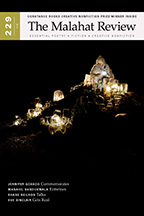Malahat Editor's Afterward: Indigenous Perspectives Issue #197
John Barton
"Long Overdue"
“Indigenous Perspectives” was in part inspired by a letter the British Columbia Arts Council sent to literary magazines in 2015, exhorting us not only to better represent Indigenous writers in our pages, but to involve them in our decision-making. I knew in my heart the Council was right. I am grateful for the honourable kick in the pants, for the journey we (contributors, guest editors, and magazine) took to arrive at “Indigenous Perspectives” has been enriching, awe-inspiring, and humbling.
Philip Kevin Paul, Richard Van Camp, and Leanne Betasamosake Simpson immediately accepted my invitation to guest-edit the issue’s poetry, fiction, and creative nonfiction. The magazine put in place the infrastructure needed to attract submissions—133 in total—and left them alone to work. Instead of watching the content for an issue amass over several months, I read what the three of them had chosen over one week—and was knocked flat. I continue to be moved, amused, bemused, horrified, and impressed by the power of the poems, short stories, and works of creative nonfiction they selected. Kevin, Richard, and Leanne each brought a distinctive editorial eye to what they considered—it’s as if three rivers with very different intoxicating chills have raised the level of a single lake, sediments and temperatures intermingling, separating into fluid, invigorating patterns. The poems that Kevin chose speak quietly of momentous things; Richard’s multi-ring circus of stories is simultaneously tragic, contemporary, and magical; the essays Leanne picked speak candidly about what must be faced up to and spoken for. I cannot think of a recent issue of The Malahat Review as thought-provoking. Nor can I thank each of them enough.
As I said, “Indigenous Perspectives” has been a humbling experience. One of my maternal great-grandfathers volunteered for the Northwest Expeditionary Force that came west in 1885 to suppress what I was taught in the 1960s to call the Northwest Rebellion and is now more justly viewed as the Resistance. A sentry upriver from Batoche, my great-grandfather describes in his diary hearing gunfire echo down the bluffs. I knew about his involvement from an early age and twenty-five years ago, a friend and I followed his movements as best we could by car—he’d travelled by train, water, and on foot—on a trip to Saskatchewan. I had wanted to get into his moment. I returned to Batoche one cold autumn day in 2008 and, standing on the church steps, listened to a Métis interpreter recount how he’d only just managed to track down descendants of one branch of his family, which scattered in suppression’s aftermath. Like nothing else, his story made actual the loss he sustained, as had countless others in the 123 years since, the Crown asserting destinies not of his or their choosing for generations. I’d entered—and in some sense have never left—the interpreter’s moment. Because of my lineage, I feel implicated. “Indigenous Perspectives” has caused me to reflect further: if today’s Indigenous peoples carry the burden of what their ancestors suffered in face of more than half a millennium of colonial displacement, I’m willing to assume responsibility for what mine imposed. Awareness of their actions sits on my shoulders. Along with supporting the redress of historic injustices, I’m certain of one step to take: engaged empathy.
Rachel George, in her review of In This Together, Fifteen Stories of Truth & Reconciliation, takes the mostly non-Indigenous contributors to task for missing the point, chiding them for their “silence on self-determination, and on the importance of our lands.” As the editor of a literary magazine whose name was appropriated fifty years ago (which I have begun to address by writing the Malahat First Nation), I can’t negotiate land claims, but I can encourage and welcome Indigenous writers to raise their voices in the conversation between our contributors and readers. I have often described the magazine’s pages as real estate and, to make what I hope won’t be seen as a trivializing metaphor of Rachel’s very important issue, these pages may also be construed as land. I trust “Indigenous Perspectives” is more than just a beginning; it is certainly not an end. I very much hope Indigenous writers will continue to submit their work to The Malahat Review and fill as theirs more of its pages in future than they have in the past. I extend the invitation to do so not to realize any government body’s aspirations, but in the real spirit of long-overdue togetherness.
As it appears in The Malahat Review's Indigenous Perspectives Issue (#197)









